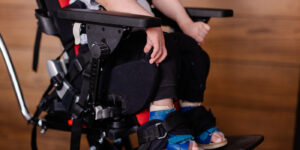Our universal areas of support
Anyone can access the resources and videos across our seven universal areas of support. You can find out more about each of the areas of support and find a range of universal and targeted support advice for each area by visiting the appropriate page.
Children and Young People who meet our eligibility criteria found at Accessing our Children's Integrated Therapy Service can also access specialist support following a referral and assessment. Please note, the Social communication and neurodevelopment support and Sensory and motor skills are universal areas of support only.
Case study
Seven-year-old Emily has cerebral palsy and learning difficulties; she is a full-time wheelchair user and needs a hoist to get from one place to another.
Specialist service
When Emily started school she was supported by specialist therapists who made sure the right equipment was available to manage her postural care.
Our Speech and Language Therapist provided a communication passport so staff knew how best to communicate with Emily and support her learning. A manual handling care plan was also put-in-place.
Our multidisciplinary team worked together to establish the best position for Emily to use a switch to make choices and communicate actions, and which switch worked well for her.
Emily’s mum noticed she was coughing more at mealtimes and discussed her concerns with the Speech and Language Therapist, who observed Emily in school and provided eating and drinking advice for staff.
Emily continues to receive regular progress and equipment reviews.
Targeted care
When Emily’s teacher noted she was showing awareness of needing to use the toilet, she immediately informed her parents and the Occupational Therapist. Together, they organised trialling a school toileting system to support regular access and boost Emily’s independence.
After two terms, the Occupational Therapist reviewed Emily’s progress with toileting and reported she was starting to remain dry.
The Speech and Language Therapist spent an afternoon in Emily’s class to work with her teacher on maximising communication in the classroom. They discussed new vocabulary resources which would help Emily with the up-coming topics.
Whole school therapeutic approach
The school team used a total communication approach to support Emily. They followed best practice guidelines to support her postural management and multi-sensory approach to learning.
All staff were trained how best to support Emily when being transferred by hoist and how to support her eating, drinking and toilet needs.
Therapists regularly attended school coffee mornings and parent’s evenings to further connect with staff and Emily’s parents, who were able to get more information about therapeutic approaches.
About
Helpful links
Give feedback
Have you used our services and want to give your views?
- Tell us your experience of using our NHS services
- Feedback about our website? Email us kentchft.eastsussexchildrenwebsitefeedback@nhs.net
Kent Community Health NHS Foundation Trust
Local stakeholders
- Contact our Children's Integrated Therapy Service
- Contact our School Health Service
- Support services in East Sussex







